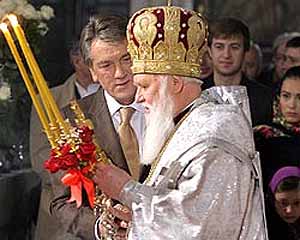05.08.2008
July 29, 2008 (the date of publication in Russian)
Alexander Rublev
OPERATION "BATHOLOMEW"
The Ukrainian National Church to be assembled by the Intelligence Service?
 Megalomania and inferiority complex are sometimes interrelated and make up an organic unity. The inward of Ukraine's President Victor Yushchenko represents an experimental proof of this observation.
Megalomania and inferiority complex are sometimes interrelated and make up an organic unity. The inward of Ukraine's President Victor Yushchenko represents an experimental proof of this observation.
On the one hand, Yushchenko fairly admits that the majority of Ukraine's citizens perceive him as a pathological loser, incapable of running the state. On the other hand, he is inclined to continue ruling the country with a rhino's obstinacy, this desire emerging from recognition of a historical endeavor he is supposed to accomplish.
The President's narrow circle, quite aware of this contradiction, seeks to persuade Mr. Yushchenko in the greatness of his personality and significance of his historical role, meanwhile solving personal problems. In particular, the President is told that if Kremlin managed to bring the unpopular Unity Party to the victory in the 1999 State Duma elections, the same endeavor is attainable also for a new party, named United Center and chaired by Victor Baloga, head of the President's Secretariat.
The same is true for ecclesiastical issues. If Vladimir Putin managed to foster unification of ROC and ROCOR, Mr. Yushchenko may also enter history as the unifier of the Ukrainian Church.
The difference is, however, that Vladimir Putin's success in unification of the Orthodox clergy was determined with his high popularity not only in Russia but also among Russian émigrés. As Mr. Yushchenko can't boast with such an advantage, he has to rely not upon his own authority but on someone else.
For that reason, the central role in the celebration of the 1020th Anniversary of the Baptism of Russia, organized in Kiev, was conveyed to Turkish citizen Dimitrios Archondonis, known in clerical circles as Bartholomew I, Ecumenical Patriarch of Constantinople.
The costly "Operation Bartholomew" was accomplished with ponderosity reminding of the last official visit of the half-immobile General Secretary Brezhnev to Ceausescu's Romania. Crowds of state employees were mobilized from their jobs to form a live corridor in order to greet the big ideological brother, with posters depicting solemn and retouched images of Bartholomew and Yushchenko.
The life corridor was designed to distract attention from the arrival of the Moscow Patriarch. However, Alexius II was expected my thousands of his numerous parish that did not require "organizing measures" to gather at the Kiev-Pechersk Monastery.
The second part of the plan of "Operation Bartholomew", supposing that the guest from Constantinople would officially agree to patronize the schismatic Ukrainian Orthodox Church of the Kiev Patriarchate, headed by Metropolitan Filaret (Mikhail Denisenko), turned a failure. Any competent politician or expert would doubt that Bartholomew could easily agree to patronize a schismatic religious entity, as in fact, the ensuing disturbance of ecclesiastic law would undermine the status of the Patriarch of Constantinople. Beyond this system of law, Dimitrios Archondonis is not more than a small Turkish official. Therefore, despite his devotion to liberty, he was not supposed to saw off the bough on which he was sitting.
It was similarly hard to imagine that Metropolitan Vladimir Sabodan, head of the Ukrainian Orthodox Church of the Moscow Patriarchate, would agree to talk with Mr. Yushchenko on the subject of the "national Church". Most Rev. Vladimir is too devoted to the principles of canonical Orthodoxy.
In his desperate effort to gain legitimization of the schism in the Ukrainian Orthodoxy, Victor Yushchenko is likely to use other levers of pressure. In the nearest future, a number of top hierarchs of UOC (MP) are expected to undergo personal pressure (through the Secretariat and the Ukrainian Intelligence Service, SBU). The idea is to convince them to address the Patriarchy of Constantinople to take them under his jurisdiction, and then to acknowledge of a schism in UOC (MP). The renegades are supposed to unify with the Lviv-based Ukrainian Autocephalic Orthodox Church as well as with Filaret's entity, to present a more acceptable scenario of potential recognition of the "national church" by Bartholomew.
Curiously, the subject of the "national church" is closely related to Victor Baloga's United Center Party project. The political project also involves Leonid Kravchuk, the first President of independent Ukraine (earlier, First Secretary of the Communist Party of Ukraine) who assisted Filaret in the 1992 schism, largely focused on alienation of part of the church property.
The probability of this scenario is arguable at least for the reason that those hierarchs who refused to recognize Filaret as their religious leader in 1992, when threats of pressure through Kravchuk-oriented criminal bosses was quite realistic, would hardly turn their back to Vladimir at the time when Yushchenko's regime is falling apart. Still, the search for renegades will continue till the last day of Yushchenko's tenure.
This means that in the nearest future, the situation in the Ukrainian Orthodoxy should be in the focus of public attention. The approach should be patient and decent. It hardly makes sense to point at Bartholomew's doubtful connections with international strategic and intelligence communities and strings of influence pulled, ironically, both through Vatican and the Anglican Church, and to mock him as "the holy father of Istanbul". It is more expedient to remind Patriarch Bartholomew of his role in protection of the sanctuaries of Tsargrad (Constantinople). This duty is more precious for religion, culture and history than the short-run attempts to position oneself as the "Pope of Orthodoxy".
Patriarch Bartholomew would be much more esteemed among believers in case he used his connections with the State Department of the United States and the British royal family not for engineering schisms in Ukrainian, Estonian, Bulgarian and Serbian Orthodox Churches but for returning the Cathedral of St. Sophia to Orthodox believers and to resume Orthodox service in this sacred place.
Number of shows: 1300
 ENG
ENG 

 ENG
ENG 
